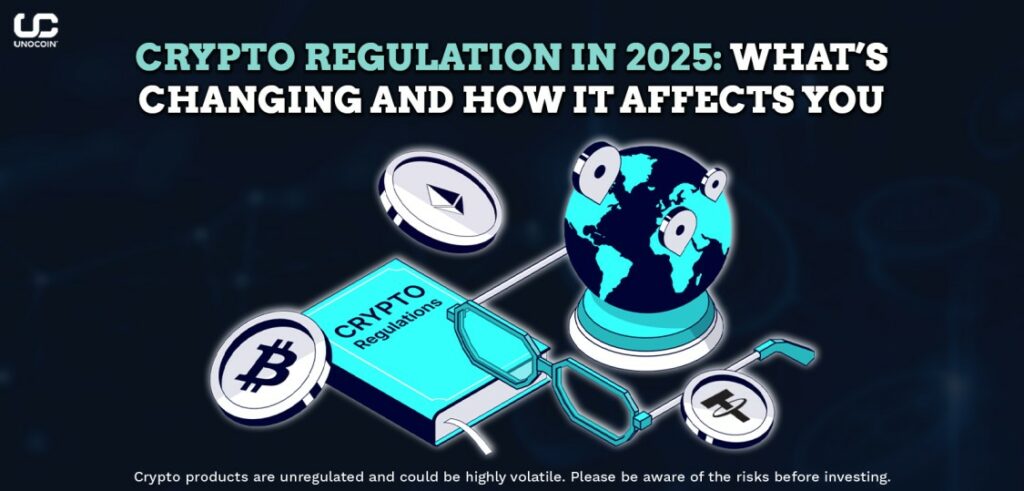As the cryptocurrency market matures, governments worldwide are introducing new regulations to ensure transparency, security, and investor protection. In 2025, crypto regulations are evolving rapidly, impacting everything from taxation and compliance to decentralized finance (DeFi) and stablecoins. Whether you’re an investor, trader, or business in the crypto space, understanding these regulatory shifts is essential for staying compliant and making informed decisions.
Key Regulatory Trends in 2025
- Stricter KYC and AML Requirements
Governments are tightening Know Your Customer (KYC) and Anti-Money Laundering (AML) regulations to prevent illicit activities such as money laundering and fraud. Crypto exchanges, wallets, and DeFi platforms must implement enhanced verification processes, making anonymous transactions increasingly difficult. - Stablecoin Oversight
Stablecoins, such as USDT and USDC, are facing increased scrutiny to ensure their reserves are fully backed and transparent. Regulatory agencies are introducing new frameworks that require issuers to provide regular audits and maintain strict compliance with financial laws. - Decentralized Finance (DeFi) Regulations
DeFi platforms, which operate without intermediaries, are now under the regulatory microscope. Some governments are proposing measures that require DeFi projects to register and implement security protocols, bringing them closer to traditional financial systems. - Crypto Taxation Policies
Tax authorities worldwide are refining their approach to crypto taxation, ensuring that profits from trading, staking, and yield farming are properly reported. Many jurisdictions are introducing automated tax reporting tools for crypto investors. - Central Bank Digital Currencies (CBDCs) and Crypto Coexistence
With several countries launching their own Central Bank Digital Currencies (CBDCs), governments are establishing clearer rules on how these digital assets will interact with cryptocurrencies, aiming to maintain monetary stability while fostering innovation. - Global Coordination on Crypto Laws
Regulatory bodies such as the Financial Action Task Force (FATF) and the International Monetary Fund (IMF) are promoting global cooperation to create unified crypto regulations. This helps prevent regulatory arbitrage, where businesses move to less restrictive jurisdictions.
Impact on Investors
- Greater Compliance Requirements: Investors using exchanges and DeFi protocols must adhere to stricter identity verification and reporting guidelines.
- Stablecoins as a Safer Bet: Regulated stablecoins may become a preferred option for investors looking for security and stability in the crypto space.
- Tax Liabilities: Traders and long-term holders need to stay updated on taxation rules to avoid legal penalties and optimize tax-efficient strategies.
- Security Considerations: With regulatory pressure on DeFi, investors must be cautious when engaging with decentralized platforms, ensuring they comply with legal frameworks.
How to Stay Ahead
- Follow regulatory updates from major financial authorities such as the SEC, EU regulators, and Asian financial bodies.
- Use compliant platforms that adhere to KYC and AML guidelines.
- Maintain accurate records of crypto transactions for tax reporting.
- Diversify investments to balance between regulated and decentralized opportunities.
Conclusion
Crypto regulation in 2025 is reshaping the industry, ensuring investor protection while maintaining innovation. By understanding these evolving laws, investors can navigate the market with confidence and compliance, securing their financial future in the digital economy.
Please find the list of authentic Unocoin accounts for all your queries below:
Twitter: https://twitter.com/Unocoin
Telegram Group: https://t.me/Unocoin_Group
Telegram Channel: https://t.me/+fasQhTKBsfA5N2Zl
E-mail id: support@unocoin.com
Other links: linktr.ee/unocoin
Contact details: 7788978910 (09:30 AM IST – 06:30 PM, Mon-Sat)
App store link: https://apps.apple.com/us/app/unocoin/id1030422972?ls=1
Playstore link: https://play.google.com/store/apps/details?id=com.unocoin.unocoinwallet
Disclaimer: Crypto products are unregulated as of this date in India. They could be highly volatile. At Unocoin, we understand that there is a need to protect consumer interests as this form of trading and investment has risks that consumers may not be aware of. To ensure that consumers who deal in crypto products are not misled, they are advised to DYOR (Do Your Own Research).

